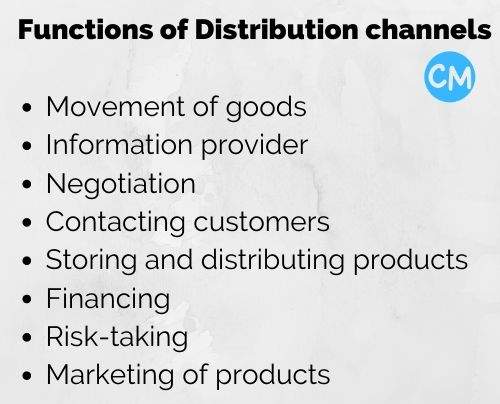Contents
Distribution Channel Definition
Distribution channel simply refers to the path or route through product moves from producer to ultimate customer. It is through distribution channels that businesses are able to deliver their products to customers. The place of production and consumption of products is not the same therefore the distribution channel has an efficient role in overcoming this problem. Distribution channel overcomes the place barrier in delivering the products. If customers are not able to get their products at the right time and in proper condition from businesses, they will definitely look for other options in the market.
Businesses should therefore carefully decide their distribution channel for serving their customers better and winning their loyalty. There are basically 2 types of distribution channels available for businesses. First one is the direct channel or zero level channel. In this channel, the producer directly delivers its products to customers with no intermediaries involved in between. Second one is the indirect channel in which there is involvement of different intermediaries and middlemen between producer and customers. These middlemen help the producers in delivering their products. These intermediaries or middlemen are known as wholesalers, retailers and agents.
Distribution channel performs a wide range of functions and facilitate the business in its operations. Some of the important role and functions of the distribution channel are discussed below:
Functions of Distribution Channels

Movement of Goods
It is important that products move from producers to customers smoothly. Distribution channels are the one through which business is able to deliver their products. The place of production and consumption of products are not the same. It is very important that products move on time and properly to their ultimate customers.
If there is no proper network for distribution, then these products are lying useless. Companies will also incur losses no matter how efficiently they are working. Movement of goods between manufacturers and customers is important task performed by the distribution channel.
Information Provider
Distribution channels are like communication network between companies and customers. It serves as the medium through which customers acquires information about companies. Companies also collect the required information from the market and its customers through their distribution network.
They receive all suggestions and complaints from their customers through this. This all collected information helps businesses in understanding the market needs better. They will implement the information collected in their strategies and will aim to improve their service quality.
Negotiation
Distribution channel does the work of negotiating with customers to arrive at fair deal. Companies do not interact directly with their customers. It is the intermediaries involved in the distribution network that reaches out to customers and meet them physically.
They give all detail information about quality, price and various terms and conditions to customers. Customers interact with these intermediaries and negotiate for a fair deal. This helps in making the customer happy and improving their loyalty towards the business.
Contacting Customers
Companies depend on distribution channels for selling their products. They use various intermediaries for distributing their products among largely scattered people. It is the role of intermediaries involved in the selling process to find and contact prospective customers.
Intermediaries meet them personally and try to match the buyer needs with their product. They motivate the buyer to buy the products. This way they contact large number of people and aim to increase the sales of companies.
Storing and Distributing Products
Storing of goods and delivering them according to needs is important role played by the distribution channels. Intermediaries involved in distribution network buys goods in large bulk from the producers. These large quantities of goods are held and stored by them safely in warehouses.
They divide these large stocks by assorting and grading as per customer requirements. It helps businesses in regulating proper supply of goods in the market as per the demands. This will increase the customer base and revenue for business.
Financing
Distribution channel provides proper finance to the businesses for carrying out these activities smoothly. They ensure a regular flow of funds to the producers. Intermediaries buys the products from producers in large bulk and make payment for their purchases. This saves the producers from blocking of funds in goods till the sale of goods.
When funds are provided timely the company is saved from facing any financial crisis. Also, the distribution channel aims at reducing the effective cost of distribution and so that the overall cost of the product can be minimised.
Risk-Taking
Distribution channel helps to distribute the risk associated with the business over large number of people. They do all functions of stock holding and delivering it to ultimate customers. Stocks are accumulated in large amount by intermediaries and stored safely in warehouses. They handle these products safely until their final delivery to customers. If any adverse condition arises in the market, they are also part of the risk involved in selling goods.
It is their duty to sell these products to people by motivating and urging them with their skill. Companies are not involved directly in the selling process. At the time of buying goods in bulk from producers, intermediaries do payment for their purchases. They take the risk of holding their money in stock until their final sale to customers.
Marketing of Products
Marketing of products is very essential to increase the sales of companies. It helps the customers in getting aware of the company presence and its products features. Efficient marketing strategies help businesses in winning the competition and ultimately the loyalty of customers. Intermediaries are the one that interacts with the customers.
They understand the customer need and accordingly introduce them with the products. Intermediaries explain customer’s features of products properly and motivate them to buy it. They also introduce different products to companies. This way they help companies in marketing their products in the market.